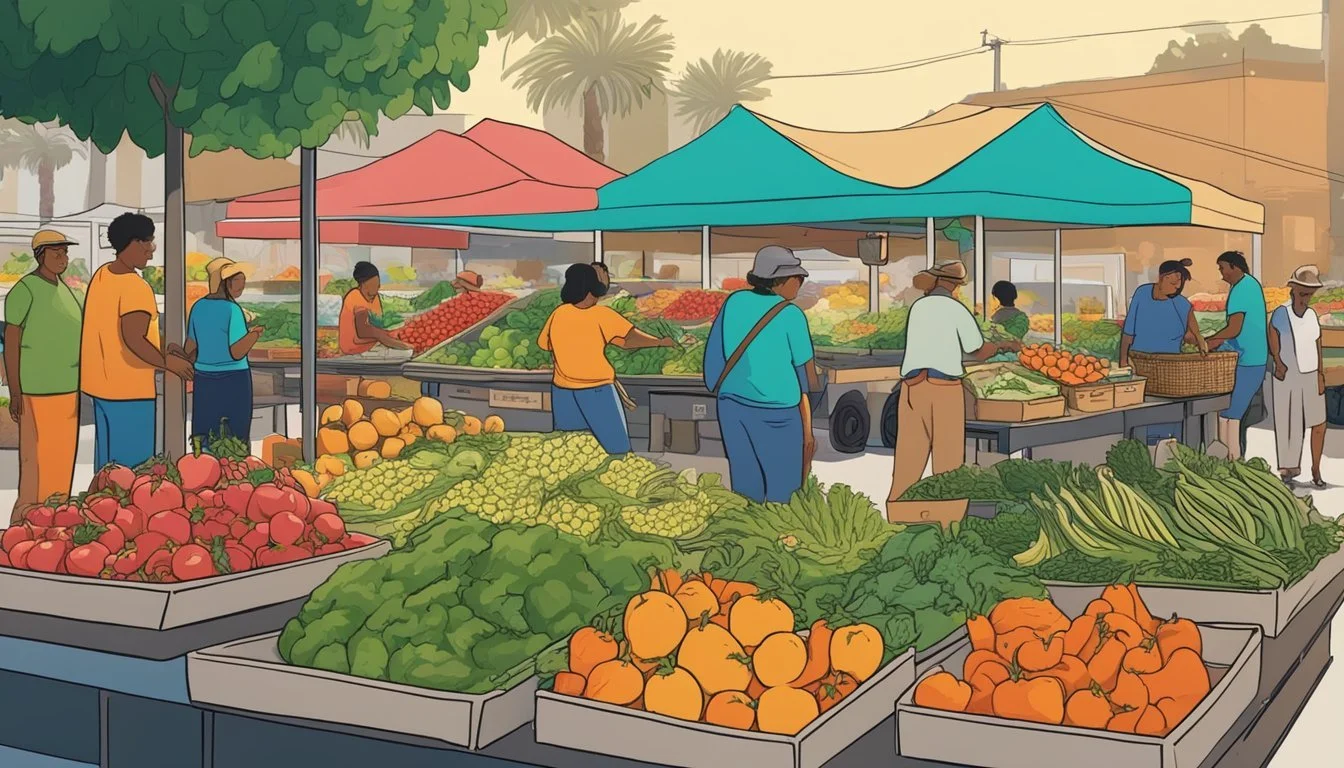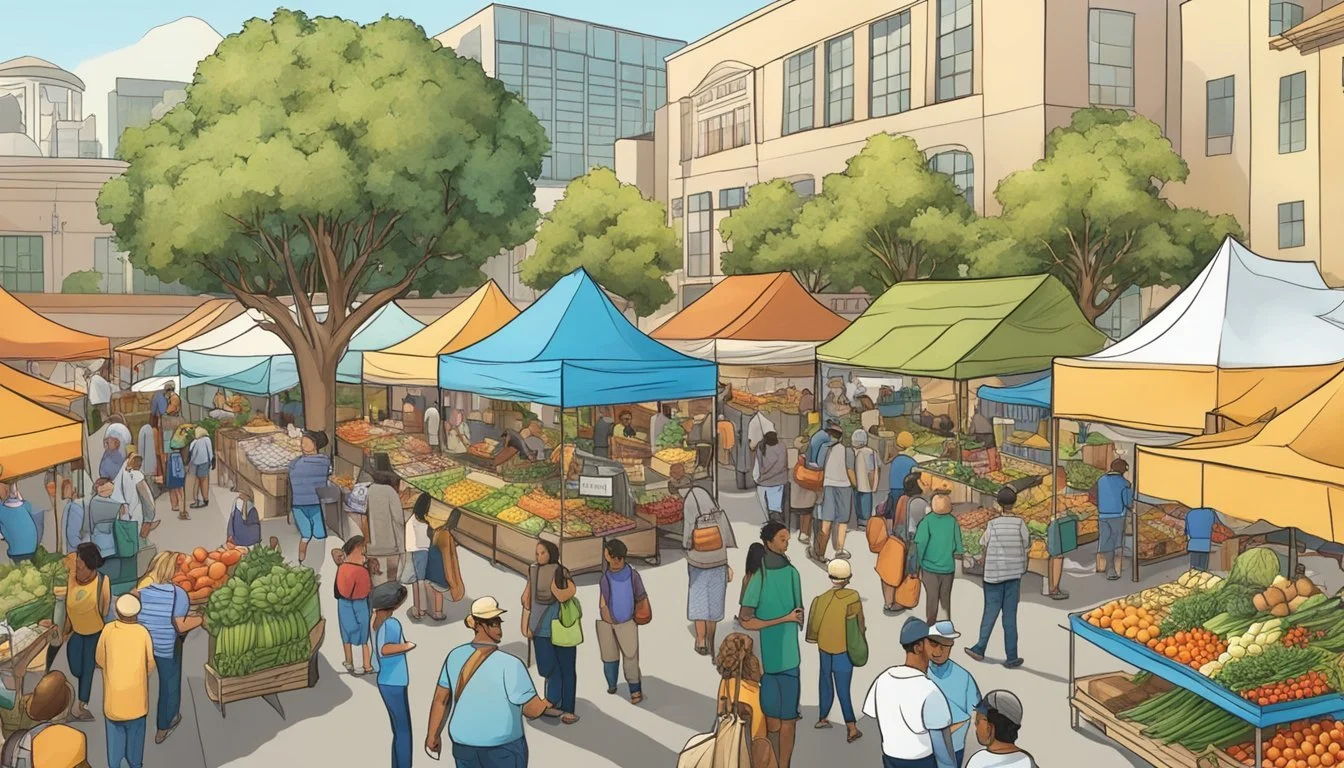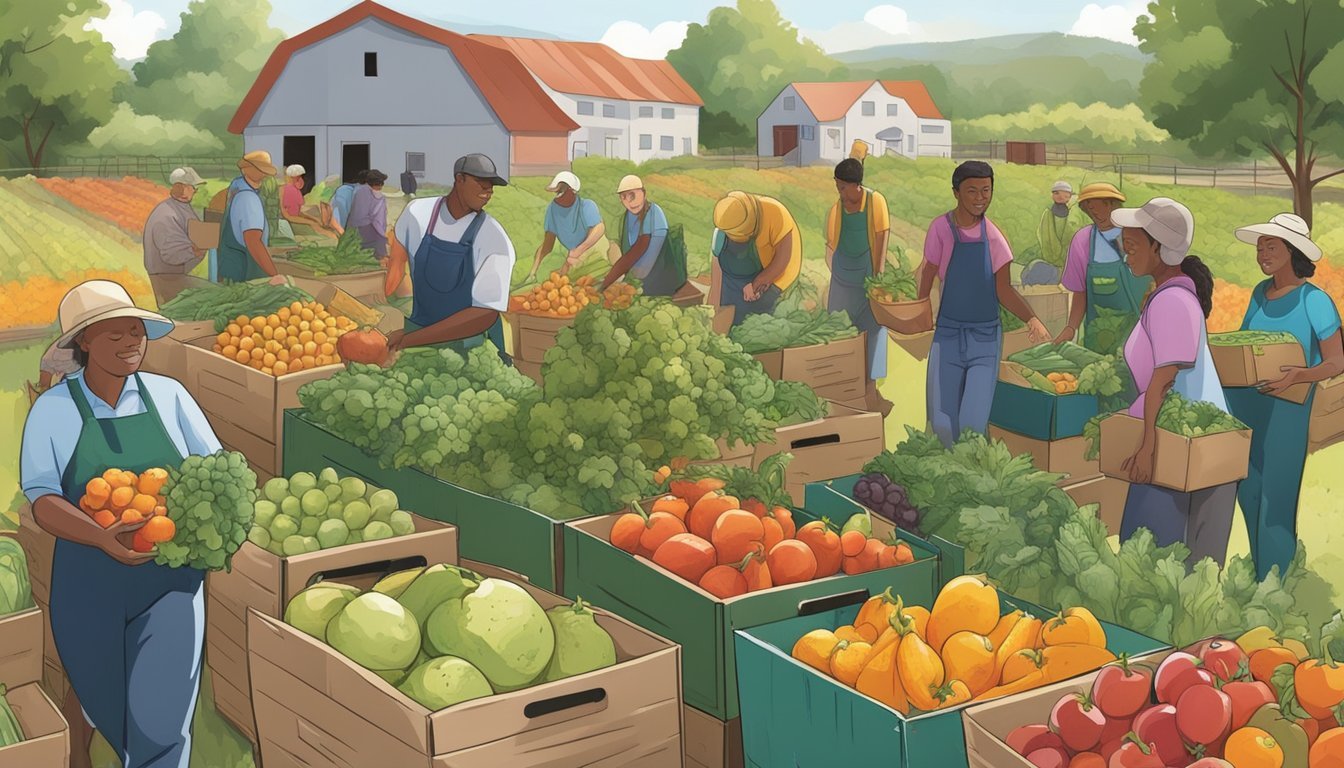Community Supported Agriculture (CSA) in Long Beach, CA
Benefits and How to Join
Community Supported Agriculture (CSA) represents a growing movement in urban areas such as Long Beach, California, where local food production and consumption are highly valued. As part of this system, residents have the opportunity to subscribe to the harvest of a local farm or a network of local farms. By doing so, they directly support the agricultural process and receive a share of the produce throughout the farming season, thereby fostering a connection between local consumers and the source of their food.
In Long Beach, CSA programs have taken root to address both the desire for fresh, healthy produce and the need for food access in areas that have traditionally been underserved. These programs often deliver a selection of fruits, vegetables, and herbs on a weekly or bi-weekly basis, and are cultivated without harmful pesticides, ensuring that members of the community receive safe and nutritious food.
The impact of CSAs extends beyond the nutritional benefits and into the realm of community building and education. Urban farms like The Growing Experience, situated in the Carmelitos Housing Development in North Long Beach, offer not only access to locally grown food but also serve as a platform for education and community engagement around sustainable agriculture. The model of CSAs is thriving in Long Beach, supported by a network of local farmers and a community keen on sustaining a healthy, accessible food system.
Understanding CSA
Community Supported Agriculture offers a unique approach for Long Beach residents to directly engage with local farms, ensuring access to fresh, seasonal, and often organic produce. The CSA model emphasizes solidarity between the community and farmers, reinforcing a sustainable agriculture system.
Core Principles of CSA
Community Supported Agriculture is grounded in several core principles that facilitate a mutually beneficial relationship between producers and consumers within Long Beach. Firstly, shares are purchased by community members from local farms, thus providing the farmer with upfront capital at the start of the growing season. This capital helps to cover anticipated costs such as seeds and labor.
Secondly, CSA embodies the practice of direct sales. It bypasses traditional supply chains, providing members with the freshest possible produce. This direct relationship enhances the community's connection to their food sources. The produce that members receive is seasonal, reflecting what is currently harvested by their local farm.
Lastly, there is an inherent sharing of risks and benefits in a CSA. Members are made aware that they share in the bounty as well as the possibility of a lesser yield, which can result from natural factors like weather.
History of CSA in Long Beach
CSA has a rich history in Long Beach that intertwines with the city's evolving embrace of local and sustainable agriculture. The movement began gaining traction in Long Beach in the early 2000s, reflecting a growing public interest in organic farming and locally-sourced food.
A central figure in this development was the introduction of Long Beach's first CSA farms, which centered their practices around organic methods and community engagement. These early pioneers set the stage for a burgeoning network of CSAs that support not only the idea of community agriculture but also the local ecosystem and economy.
Benefits of Joining a CSA
Joining a Community Supported Agriculture (CSA) program offers individuals in Long Beach, CA, direct access to high-quality, fresh produce while also fostering a sustainable local food system.
Nutritional Advantages
CSA members typically receive a diversity of seasonal fruits and vegetables, which are often harvested at their peak of freshness and flavor. This translates to a higher content of nutrients and antioxidants compared to some store-bought produce which may have traveled long distances and been stored for extended periods. The emphasis on organic produce in many CSAs means subscribers benefit from food that is less likely to contain pesticide residues, promoting a healthier diet overall.
Seasonal harvests: Ensures a variety of produce high in essential vitamins and minerals.
Organic options: Often available, supporting consumption of food with fewer pesticides.
Environmental Impact
CSA programs in Long Beach, CA, often employ sustainable farming practices, such as composting, natural pest control, and crop rotation, which minimize the impact on the environment. By reducing the need for long-distance transportation, CSAs lower carbon footprints, contributing to greener local food systems. Moreover, CSAs support local farms, thus preserving green spaces and reducing urban sprawl. Community participation in CSAs fosters a stronger bond with the land and an appreciation for the natural resources.
Reduced carbon footprint: Local produce means less transportation, storage, and associated emissions.
Sustainable practices: Support for farming methods that protect and nurture the environment.
CSA Membership and Subscription Details
Community Supported Agriculture in Long Beach, CA, offers residents a chance to engage directly with local food systems. Through membership and subscription, individuals can receive a consistent supply of fresh, seasonal produce from their chosen farm.
How to Become a Member
To become a member of a CSA program in Long Beach, one must typically register with their chosen local farm. The registration involves purchasing a subscription, known as a "share," which provides them with a range of farm products. The process may include:
Selecting a share size: Members choose what size fits their needs, from smaller shares for individuals to larger ones for families.
Pickup or delivery options: Normally, members select their preferred way to receive their shares, either by picking up at designated locations or opting for a home delivery service, if available.
Understanding CSA Shares
A CSA share is the cornerstone of the subscription model, representing a portion of the farm's produce. Shares usually consist of:
Contents: A variety of vegetables, with potential inclusion of fruits, herbs, and other farm products.
Seasonality: Shares reflect the seasonal availability of produce, ensuring members receive the freshest possible goods.
Duration: Subscriptions often run throughout the main growing season, which in California can vary but typically spans from May to October.
Frequency: Members receive their share on a regular schedule, commonly weekly or bi-weekly.
By participating in a CSA program, members are directly supporting their local farmers and contributing to the sustainability of the community's food supply.
Local Farms and CSA Programs
In Long Beach, California, Community Supported Agriculture (CSA) connects consumers with local farms, offering fresh, seasonal produce, fruits, and herbs through a subscription-based model.
Local CSA Farms
Long Beach area boasts a variety of local farms participating in CSA programs, giving residents access to fresh, organically grown produce. One notable farm includes The Growing Experience, an urban farm located in north Long Beach, providing a bounty of fresh produce without the use of harmful pesticides. Additionally, consumers can enjoy the benefits of JR Organics based in Escondido, which, while not in Long Beach, extends its services to the local community, and South Central Farmers' CSA program, having a prominent place in local agriculture.
Some Local CSA Farms include:
The Growing Experience (Long Beach, CA)
JR Organics (Escondido, CA)
South Central Farmers (Buttonwillow, CA)
Seasonal Offerings from Long Beach Area
Residents enrolled in CSA programs can expect a diverse range of seasonal offerings. These often include crisp vegetables like kale and beets, juicy fruits such as strawberries and grapefruit, and flavorful herbs. The seasonal nature of these CSAs ensures that members receive the freshest possible produce throughout the year. For example, spring might bring an abundance of strawberries and kale, while fall could be ripe with grapefruit and broccoli.
Remember, what's available will greatly depend on the time of year:
Spring Selection:
Strawberries
Kale
Fall Assortment:
Grapefruit
Broccoli
Joining a local CSA program in Long Beach supports regional farmers and provides a steady supply of wholesome and fresh farm products, promoting sustainable agriculture and a healthier community.
Organic Practices in CSA
When discussing Community Supported Agriculture (CSA) in Long Beach, CA, organic practices are central to many farms' operations. These practices are designed to cultivate produce in ways that maintain soil health and minimize environmental impact.
Organic Certification
Certified organic farms in the Long Beach area must adhere to strict guidelines set forth by national standards. For a CSA to be officially recognized, farmers must ensure an absence of synthetic fertilizers and pesticides in their production. Certification requires detailed record-keeping and periodic audits to maintain integrity and consumer trust.
Key Requirements for Certification:
Avoidance of synthetic fertilizers and pesticides
Use of organic seeds and planting stock when available
Implementation of crop rotation and green manure to manage soil health
Regular inspection and compliance audits
Farming Without Harmful Pesticides
CSA providers in Long Beach prioritize farming practices that forgo harmful pesticides in favor of natural alternatives. They employ various strategies to control pests and diseases without compromising the ecosystem or consumers' health.
Alternative Practices Include:
Introduction of beneficial insects to control pest populations
Usage of natural composts to enrich soil fertility
Employment of mechanical and manual weeding techniques
Selection of disease-resistant plant varieties for greater resilience
Through careful stewardship and a commitment to sustainable food systems, CSA farms in Long Beach offer locally sourced, organic produce that supports both the community and the environment.
Community Engagement and Education
Community Supported Agriculture (CSA) programs in Long Beach, CA, place a strong emphasis on fostering community involvement and providing educational opportunities. Programs such as The Growing Experience at the Carmelitos Housing Development engage the community through a variety of workshops and volunteer opportunities.
Workshops and Farm Tours
The Growing Experience, an urban farm nestled within North Long Beach, conducts educational workshops that cover sustainable farming practices and healthy living. Interested individuals can participate in classes aimed at spreading knowledge about organic food production and environmental stewardship. Farm tours are also organized for the community, providing an insight into the operations of an urban farm, and strengthening the relationship between consumers and their local food sources.
Workshops offered include:
Sustainable agriculture techniques
Healthy cooking and nutrition
Environmental education
Farm Tour Features:
Guided walkthroughs of the 7-acre farm
Demonstrations of organic farming practices
Discussion on the importance of local food systems
Volunteer Opportunities
Volunteering at local CSA farms like The Growing Experience provides community members with hands-on experience in agriculture. They can also contribute to the community by assisting in the cultivation of fresh produce, which is especially valuable in traditionally under-served areas. By volunteering, community members not only support the mission of these urban farms but also gain practical knowledge that can translate into personal and wider community benefits.
Volunteer Roles may include:
Planting and harvesting crops
Assisting in farm maintenance
Helping during community events
Through these educational and volunteer opportunities, Long Beach CSA programs hope to inspire and empower residents to take an active role in their local food systems and community well-being.
Challenges Facing CSA in Long Beach
Community Supported Agriculture in Long Beach is confronted with issues unique to the locality. The intricacies of the microclimate and urban development pose robust challenges that require thoughtful solutions.
Weather and Seasonal Variabilities
In Long Beach, CSAs face the challenge of weather and seasonal variabilities that can impact crop yield and diversity. The climate in this coastal city can cause unexpected shifts between cool, foggy conditions to intense, dry heat. The seasonal weather patterns require farmers to adapt their planting schedules and crop selections meticulously to ensure a consistent supply of local food. This variability can strain a farm family's ability to predict and sustain crop production, potentially affecting the reliability of deliveries to CSA subscribers.
Land Availability Issues
The availability of arable land is a significant hurdle for Long Beach CSAs. Urban development has encroached on land historically used for agriculture, reducing space available for sustainable farming. Farmers often compete with developers for precious plots, and the high cost of land in the region can be prohibitive. Detailed data on land use is critical for developing strategies to secure agricultural spaces to support local food systems and ensure the longevity of CSAs in the city.
Supporting the Local CSA Ecosystem
In Long Beach, CA, the CSA ecosystem thrives through strategic partnerships and community-oriented events that promote the cycle of local food sourcing, consumption, and education.
Partnerships with Restaurants and Markets
Local CSAs in Long Beach have fostered beneficial partnerships with area restaurants and markets, creating a stable demand for fresh, seasonal produce. Restaurants often highlight CSA-sourced ingredients, emphasizing farm-to-table dining experiences. This symbiotic relationship not only ensures that kitchens receive high-quality ingredients but also that CSA programs can count on consistent sales. Moreover, markets often carry surplus produce from CSAs, which aids in minimizing food waste and provides consumers with additional access points to locally grown food.
Key Partnerships:
Restaurant "Farm-to-Table" Initiatives
Market Retailing of Seasonal CSA Surplus
Community Events and Farmers Markets
Community events and farmers markets serve as pivotal spaces for CSAs to connect directly with the Southern California community. Not only do these events provide a platform for education and outreach about the benefits of supporting local agriculture, but they also offer a venue for extra produce sales. Long Beach's diverse farmers markets, such as the Downtown Farmers Market, serve as weekly hubs where consumers can meet their local farmers, understand their agricultural practices, and purchase fresh CSA shares.
Notable Community Event Locations:
Downtown Farmers Market
Seasonal Agriculture Fairs
Advanced Topics in CSA
This section delves into the pivotal role of data and research in expanding the understanding of CSA's impact while examining cutting-edge, sustainable practices being implemented in local food systems.
Research on CSA Impact
Research in Long Beach indicates that participation in CSA programs fosters sustainable food systems by encouraging the growth of local produce such as the Fuerte avocado tree and Valencia orange trees. This promotes biodiversity and reduces the carbon footprint associated with transportation of goods. Studies from organizations like Community Supported Agriculture (CSA) Guide emphasize CSA's role in supporting socio-economic upliftment in urban areas such as south-central Los Angeles, with initiatives like South Central Farmers' Cooperative, which not only offer fresh produce to members but also contribute to the local economy.
Innovative CSA Practices
The Growing Experience, a 7-acre urban farm in north Long Beach, exemplifies innovative CSA practices. It emphasizes non-traditional urban farming techniques, possibly including the utilization of McCrawls redworms for composting to improve soil health and yield. Their approach can be seen as a demonstration of regenerative farming, which aims to go beyond sustainability by actively enhancing the ecosystem. Further innovation is seen in educational programs that teach youth about CSA practices, equipping a new generation with the skills and knowledge to perpetuate and enhance local food systems.
Resources for CSA Members and Enthusiasts
As a CSA member or enthusiast in Long Beach, valuable resources can enhance one's experience with organic and fresh produce directly from the farm. These tools can assist in making the most of every CSA share, from preparing flavorful dishes to understanding the ins and outs of the CSA model.
Recipes and Cooking Tips
For CSA shareholders looking to transform their fresh produce into delicious meals, a variety of resources are available:
Farm Websites: Farms like Tanaka Farms often provide recipes tailored to their harvest on their websites.
Local Cookbooks: Seasonal cookbooks from Long Beach area chefs focus on local flavors and produce.
Cooking Classes: Some CSAs offer classes or cooking demonstrations for members.
Online Databases: Websites like LocalHarvest offer a collection of recipes designed for CSA produce.
Here is a brief list of tips to keep in mind:
Explore Seasonality: Let the CSA schedule dictate the menu, creating dishes based on what is fresh and available.
Flexibility Is Key: Be ready to substitute ingredients in recipes based on the week's share.
Balanced Storage: Learn the best ways to store different types of produce to maximize flavor and longevity.
Frequently Asked Questions
CSA members typically have common inquiries that can be broadly answered:
What is included in a share? CSA shares often contain a variety of vegetables and may include other farm products. Each share is a selection of the current harvest, focusing on organic and fresh produce.
How to pick up shares? Most CSAs in Long Beach have a set schedule for shareholder pickups at designated locations, reducing the need to visit grocery stores. Tanaka Farms and other local CSAs may also offer delivery options.
What if I miss a pickup? Check with the CSA for their specific policy. Some may allow shareholders to collect their share at a later time, offer a hold or allow shareholders to have someone else pick up their share.
Can I choose what is in my share? Generally, shares are predetermined by the farm based on availability, but some CSAs might allow for customization or swapping of certain items.
By utilizing these resources, CSA members in Long Beach can optimize their experience with the community-supported agriculture program, ensuring they get the most out of their investment in sustainable and local agriculture.








